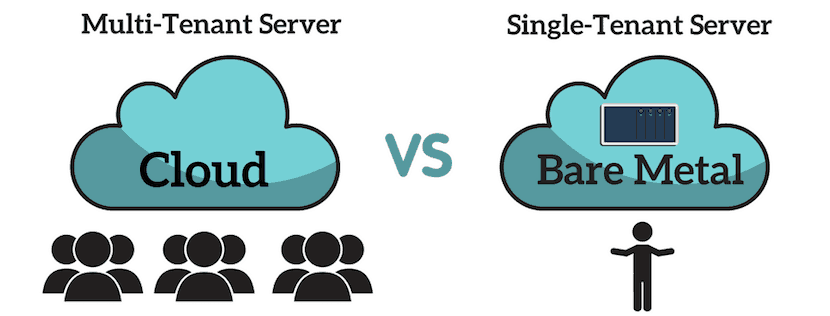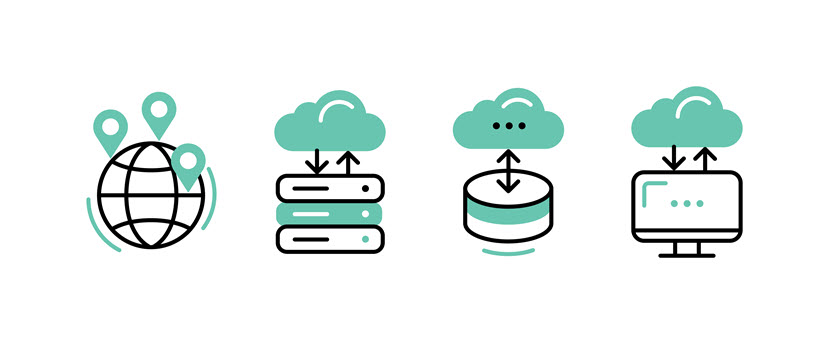Businesses are constantly on the lookout for the most suitable home for their IT infrastructure. Two reliable and efficient hosting options are coming up as the best contenders – colocation and cloud hosting. Both have unique traits that are attractive to organizations, whether they wish to utilize private, dedicated, or shared resources.
This article explains the differences between colocation and the cloud and gives advice on how to choose the best solution depending on your business needs.
Colocation vs. Cloud: An Overview
Here is an overview of the differences between the colocation and the cloud.
| Point of Comparison | Colocation | Cloud |
| Service | Physical space in a data center housing privately-owned servers | Virtualized computing resources on dedicated or shared servers |
| Cost/payment model | Fixed monthly or yearly fee based on the amount of resources used | Pay-as-you-go or subscription model based on the amount of resources used |
| Additional costs | Purchasing, transporting, and on-site hardware maintenance | Data transfers, premium support, additional services, and features |
| Security | Physical security provided by the colocation vendor; digital security provided by the client | Security provided entirely by the cloud provider |
| Compliance | Responsibility of the company since it provides its hardware | Responsibility of the cloud provider |
| Flexibility | Less flexible; dependent on the company’s investments and interventions | More flexible; scalable on demand |
| Benefits | Full control over hardware, predictable costs, customization, security, and stability | No upfront costs, scalability, global reach, integration and automation, disaster recovery, security |
| Challenges | Requires more upfront investments, hardware can become outdated, limited scalability and flexibility, potential for overprovisioning | Unpredictable costs down the line, vendor lock-in, limited control, compliance issues, higher security risks on public clouds, complexity |
Colocation vs. Cloud: A Detailed Comparison
Here is a detailed comparison of the colocation and the cloud.
Service
Colocation is when a business rents physical space in a third-party data center for its servers and hardware equipment. The data center commonly provides:
- Physical space in the form of racks, cabinets, or cages
- Bandwidth
- Connectivity
- Power
- Cooling
- Security
The business typically provides:
- Servers
- Hardware
- Software
- Storage
The cloud is a broad term that refers to the delivery of services, such as storage, servers, databases, software, analytics, etc., over the internet. Users do not need to own or maintain servers and data centers physically. Rather, they can access all of these services remotely through third-party providers.
Costs
Colocation requires more upfront costs since businesses need to invest in their own hardware and pay a fee for the space, power, bandwidth, and security in the data center. They also have to bear the cost of maintaining and upgrading their equipment. However, colocation pricing is more predictable as companies usually sign contracts for a set period.
Cloud costs change based on resource consumption, including computing power, bandwidth, storage, and other services. Cloud providers typically operate a “pay-as-you-go” model, meaning that there are no upfront costs for businesses. However, as time passes, cloud expenditure can rise as usage increases and a business’s needs for scaling, data transfers, and specialized services expand.
Get the best of both worlds with Bare Metal Cloud. Spin up high-performance physical servers with a simple API call. Check out our flexible and cost-effective pricing options, and pay only for what you need.

Security
With colocation, the facility provides physical security of servers in data centers, including access control, surveillance, and maintaining the right environment (power and cooling). However, businesses must take measures to protect their data, maintain network security, and ensure that their assets are safe from cyber threats.
In the case of cloud services, responsibility for maintaining cloud security is shared between the provider and client in what is called the shared responsibility model. This means that the CSP is tasked with protecting the security “of” the cloud (infrastructure, hardware, software, network, etc.) while the business is responsible for security “in” the cloud (data, access, applications, etc.).
Compliance
In colocation, businesses customize their hardware and software components and adjust them to fit compliance requirements. This is especially important for businesses that operate in strictly regulated industries (finance, healthcare, etc.), where there are strict mandates regarding encryption, data handling, network security, and other technical aspects.
In cloud hosting, compliance is a joint effort between the CSP and the client. While the cloud provider ensures the underlying infrastructure and services are compliant, the business is responsible for configuring those services in a manner that maintains compliance.

phoenixNAP’s HIPAA-ready hosting is designed to help healthcare organizations maintain the highest compliance standards.
Flexibility
Colocation offers limited flexibility since migrations, changes, and adjustments frequently involve physically adding more servers and hardware, and reconfiguring them in the data center. Scaling also presents a challenge since it requires adding more hardware and re-negotiating contracts for more space and resources. All of this takes more time to do and might involve downtime.
Cloud hosting solutions are adaptable and scalable by design, allowing businesses to add and remove resources on demand. Thanks to server virtualization technology, businesses can easily adjust resources to their business needs and changing workloads.
Benefits
Colocation benefits include:
- More control: Colocation gives businesses full control over hardware and software components.
- Predictable costs: Businesses decide how much they wish to spend depending on the resources they need to perform their business operations.
- Customization options: Colocation gives businesses customization options that help optimize performance while leveraging the robust infrastructure of data centers.
- Security and stability: Data centers provide security and environmental controls, which ensures the stability, optimal performance, and protection for the hosted equipment.
On the other hand, the benefits of the cloud are:
- No upfront investments: Businesses pay only for resources they consume.
- Scalability: The cloud provides scalability on demand for businesses with changing workloads.
- Global reach: The cloud allows access to data centers around the world, allowing businesses to deploy resources where their end-users are.
- Integration and automation: Cloud platforms offer a broad range of integrated services and automation tools that support business operations.
- Disaster recovery: Cloud providers leverage redundancy and distribution of their infrastructure to offer continuous support with multi-layered solutions for disaster recovery.
- Security: Cloud providers use their expertise to build security tools and features that their clients can leverage to address potential security threats.
Challenges
The challenges of colocation include:
- Upfront investments: Businesses must invest in their own hardware and equipment.
- Hardware may become outdated: Hardware has a lifecycle, and after some time, it may need to be replaced.
- Limited scalability and flexibility: Configuration upgrades and changes are limited by the capacities of the data center.
- On-site management and maintenance required: Businesses need staff with a high level of expertise to manage and maintain equipment at the colocation facility.
- Potential underutilization: Incorrectly predicting resource utilization leads to overprovisioning, which wastes resources and adds extra costs.
On the other hand, these are the cloud challenges to pay attention to:
- Unpredictable costs: Businesses cannot always accurately anticipate costs as workloads and needs change.
- Vendor lock-in: Migration between two cloud providers is challenging as they each possess specific configurations and services.
- Limited control: Businesses do not have direct control over infrastructure in the cloud.
- Compliance issues: If data is stored in regions with different regulations, this can present a challenge for achieving compliance.
- Higher security risks: Cloud security risks stem from the possibility of misconfigurations and misunderstandings of the shared responsibility model.
- Complexity: Lack of understanding and poor management of the plethora of services and options in the cloud can lead to sub-optimal setups and inefficiencies.

How to Choose Between the Colocation and the Cloud?
The colocation and the cloud both have many advantages that businesses find useful. However, some organizations might find one more suitable than the other.
Colocation Use Cases
The following organizations benefit the most from colocation:
- Large corporations: Companies that have specific hardware and software requirements and need the granular control that cloud environments don’t provide.
- Financial institutions: These institutions operate under strict regulatory standards and prefer the transparency and control that colocation offers.
- Telecommunication companies: These companies benefit from the direct physical connection to multiple network providers available at colocation facilities.
- Government and defense organizations: Organizations that have stringent requirements when it comes to security, control, and transparency find that colocation is a suitable choice.
Cloud Use Cases
Cloud is a suitable option for the following organizations:
- Startups: Cloud hosting is a smart choice for startups since they require flexibility and predictable costs.
- Ecommerce businesses: Cloud is a better option for these businesses since they experience changes in traffic (for example, during the holiday season).
- Media and entertainment: These companies benefit from the cloud since they reach a global audience and experience unpredictable traffic.
- Software developers: Cloud is the ideal environment for developing and testing software and applications.
- Education institutions: Cloud is great for managing student data and virtual learning.
Colo or Cloud: Closing the Debate
Colocation and cloud both offer a unique set of advantages to organizations. While the cloud boasts scalability and flexibility, colocation offers control, stability, and customization. The choice between the two ultimately depends on the organization’s needs, goals, and budget.
For all your colocation and cloud needs, reach out to our experts at phoenixNAP to request pricing for a tailored hosting solution for your business.



